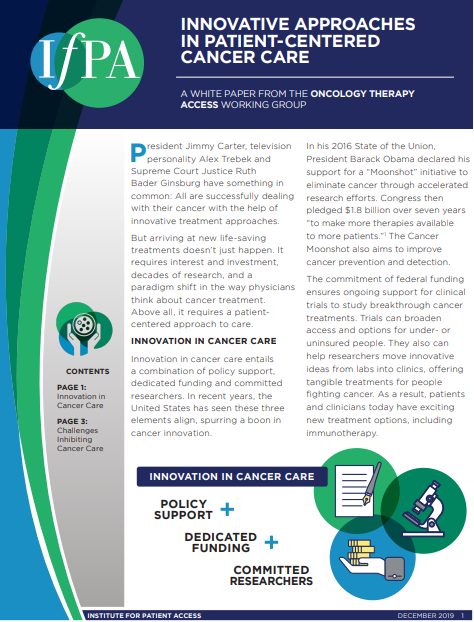New Label Could Fix Medicaid’s Insulin Pen Misstep

An updated label from the Food and Drug Administration now discourages pharmacies from dividing prepackaged cartons into individual pens before distributing.
Policymakers Prep for “Cures 2.0”

Reps. Diana DeGette and Fred Upton, who authored the 21st Century Cures Act in 2016, announced last year their intention to update the bill in 2020.
2019 in Review: Six Policies that Shaped Patient Access
Before closing the door on 2019, IfPA looks back at the trends that impacted patient access this year.
New Research, More Doubts about Tubing Safety for Infants

Certain hospital tubing devices could actually endanger infants, more new research confirms.
Innovation Spurs Need for Patient-Centered Cancer Care

Successfully fighting cancer with innovative treatments requires a patient-centered care approach, notes a new white paper from the Alliance for Patient Access’ Oncology Therapy Access Working Group. But for more people to do the same, policy needs to enable a more patient-centered approach to care.
Pushing for a Step in the Right Direction

As a dermatologist, it is my job to take the clues the skin provides and interpret these to do my very best to diagnose, monitor and treat my patients. Insurance companies sometimes make that difficult.
Human Milk’s “Secret Ingredients”

Researchers may have pinpointed the “secret ingredients” that allow human milk to protect newborns against a life-threatening condition called necrotizing enterocolitis. They are HMOs – human milk oligosaccharides.
Don’t Tie Clinicians’ Hands on Gout Prescriptions

Often we think of barriers to medical treatment as something that happens after patients have a prescription from their health care provider. We think of fail first, lengthy prior approvals or high co-pays that make accessing treatment difficult. But for gout patients, an emerging obstacle will keep some of them from ever reaching that point. […]
Patient-Centered Care Dominates Pain Policy Summit
If policymakers want to tackle America’s pain problem, they should begin by embracing individualized, patient-centered, care.
QALYs Under Fire

The QALY gives a one-size-fits-all measure of value that doesn’t reflect the needs and experiences of real patients.

